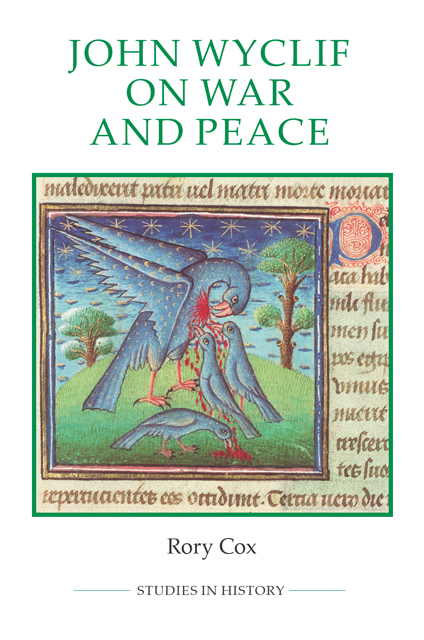Book contents
- Frontmatter
- Dedication
- Contents
- Acknowledgements
- Abbreviations
- A note on the chronology of Wyclif’s Latin works
- Introduction: War, peace and Wyclif
- 1 The development of just war doctrine up to the fourteenth century
- 2 Wyclif’s rejection of just cause
- 3 Wyclif’s rejection of proper authority
- 4 Wyclif’s rejection of correct intention
- 5 Wyclif on politics
- 6 The medieval pacifist
- Conclusion
- Bibliography
- Index
- Frontmatter
- Dedication
- Contents
- Acknowledgements
- Abbreviations
- A note on the chronology of Wyclif’s Latin works
- Introduction: War, peace and Wyclif
- 1 The development of just war doctrine up to the fourteenth century
- 2 Wyclif’s rejection of just cause
- 3 Wyclif’s rejection of proper authority
- 4 Wyclif’s rejection of correct intention
- 5 Wyclif on politics
- 6 The medieval pacifist
- Conclusion
- Bibliography
- Index
Summary
Throughout this volume the term pacifism has been used to describe two mutually coherent moral-intellectual positions: the rejection of traditional just war doctrine and the moral rejection of war. Wyclif’s rejection of just war doctrine has already been established, thus much of the task of showing Wyclif to be a pacifist is complete. The purpose of this chapter, then, is to focus on the second sense of pacifism and to demonstrate Wyclif’s moral rejection of war. His radical thought on war, which was very much rooted in a deeply felt moral aversion to violence as well as to the causes and effects of warfare, led Wyclif to espouse non-violent action and even non-resistance.
The metaphysical grounds for non-violence
During the late Middle Ages the two dominant and opposing schools of metaphysics were those of realism and nominalism. Grounded in Platonic and Aristotelian metaphysics, and the more prevalent school up to the fourteenth century, realism sought to explain the nature of being by postulating the existence of universal ideas in the mind of God, in which all things partook and through a shared essence connected individual members within a universal. A universal was something predicated of many particulars, and the essence of the universal remained eternally in God. Universals were correspondingly organised into a hierarchy of being. Within this hierarchy of being, every individual human, for example, was a member of the universal species ‘Human’, just as the species Human inhered in the universal genus Animal, and so on. According to realists, the relationship between individuals and universals consisted of much more than a linguistic or accidental relationship; rather, it was a relationship whereby the individual shared in the essence of the universal in which it inhered. Objects and entities, especially animate entities, inhered in numerous universal qualities at the same time: an individual human, therefore, was a metaphysical composite of any number of universals. So, the man ‘Paul’ belonged to the universal ‘Human’ (a ‘universal by community’: universale communicatione), as well as inhering in the universals of properties like ‘blue eyedness’, ‘brown hairedness’ and so on.
Nominalism, in contrast, postulated that individuals denominated by a single term had no connection beyond the linguistic term itself or the mental image it was used to construct.
- Type
- Chapter
- Information
- John Wyclif on War and Peace , pp. 135 - 164Publisher: Boydell & BrewerPrint publication year: 2014



